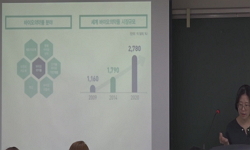본 논문은 요한복음에 나타난 예수 그리스도의 신적 생명의 신학적 주제에 초점을 맞추어, 교회사 전반에 걸쳐 생명에 대한 신학적 이해가 어떻게 발전해왔는지를 분석하고, 이를 현대적 맥...
http://chineseinput.net/에서 pinyin(병음)방식으로 중국어를 변환할 수 있습니다.
변환된 중국어를 복사하여 사용하시면 됩니다.
- 中文 을 입력하시려면 zhongwen을 입력하시고 space를누르시면됩니다.
- 北京 을 입력하시려면 beijing을 입력하시고 space를 누르시면 됩니다.
생명 개념에 대한 역사신학적 연구 : 요한복음에 나타난 생명을 중심으로 = A Historical-Theological Study on the Concept of Life : Focusing on the Life in the Gospel according to the John
한글로보기https://www.riss.kr/link?id=T17202758
- 저자
-
발행사항
천안 : 호서대학교 연합신학전문대학원, 2024
-
학위논문사항
학위논문(박사) -- 호서대학교 연합신학전문대학원 , 이론신학과(역사) 역사신학전공 , 2025. 2
-
발행연도
2024
-
작성언어
한국어
- 주제어
-
발행국(도시)
충청남도
-
형태사항
206 ; 26 cm
-
일반주기명
지도교수: 김동주
-
UCI식별코드
I804:44018-200000865758
- 소장기관
-
0
상세조회 -
0
다운로드
부가정보
국문 초록 (Abstract)
이 연구는 생명이 신학적 및 역사적 관점에서 기독교 신앙과 실천의 중심 주제로 남아 있음을 강조한다. 더 나아가 생명을 더욱 풍부하고 포괄적으로 이해하며, 실천적 책임감을 가지고 살아가는 데 도움을 주고자 한다. 요한복음에 나타난 생명의 메시지가 교회와 신앙 공동체의 사명과 실천에 중심적이라는 점을 재확인하며, 현대 기독교 영성을 위한 새 비전을 제시하려 한다.
초기 교부들, 특히 오리게네스, 암브로시우스, 아우구스티누스, 요한 크리소스톰은 생명을 단순히 물리적 존재로 보지 않고, 하나님과의 깊은 관계에서 비롯된 영원한 생명으로 간주했다. 그들은 요한복음에 나타난 생명의 본질을 믿음의 여정과 영적 성숙을 통해 경험하는 신적 선물로 해석하며, 하나님과의 교제를 통해 누릴 수 있는 축복으로 보았다. 이러한 통찰은 초기 교회에서 구원론과 밀접히 연결된 생명의 신학적 기초를 확립하는 데 크게 기여했다.
종교개혁가들인 루터, 칼뱅, 웨슬리는 생명의 개념을 믿음, 은혜, 칭의의 교리와 연결시키며 재해석했다. 그들은 생명을 믿음을 통해 얻는 하나님의 은혜로운 선물로 보고, 그 본질을 구원과 변혁적 신앙 경험으로 묘사했다. 루터는 칭의와 구원의 중심에 생명을 두며 성례전을 통해 지속적으로 누리는 것으로 강조했다. 칼뱅은 생명을 하나님과의 연합을 통해 완성되는 것으로 보았고, 웨슬리는 생명을 개인적 성결과 성화의 열매로 해석하며, 영적 갱신을 교회의 사명으로 간주했다. 이들의 관점은 생명을 단순한 신학적 주제를 넘어 믿음과 실천에 적용 가능한 원리로 만들었다.
현대 영적 지도자들인 찰스 스펄전, 앤드류 머레이, A.B. 심프슨은 생명의 개념을 더욱 확장하여, 개인 구원과 영적 현실을 넘어 윤리적 책임과 공동체적 사명과 연결시켰다. 스펄전은 생명을 복음을 통한 영혼 구원의 원동력으로 보며, 복음 전도에 헌신했다. 머레이는 생명을 성령과의 교제를 통해 신자들의 삶 속에서 지속적으로 작용하는 은혜로 보았다. 심프슨은 생명을 사회적 책임과 공동체적 실천과 결합하여 현대 기독교 신앙을 위한 포괄적 비전을 제시했다. 그들은 생명의 메시지가 현대적 맥락에서도 변혁적 힘을 유지하고 있음을 보여주었다.
이 연구는 시대를 초월한 생명의 신학적 이해의 공통점과 차이점을 규명하며, 현대 신학과 실천에서 요한복음의 생명의 메시지가 갖는 중요성을 분석한다. 개인 구원과 영적 성장뿐만 아니라 윤리적 책임, 공동체적 참여, 사회적 실천을 포함하는 폭넓은 신학적 관점과 실천적 방향을 제시하고자 한다.
본 논문은 요한복음에 나타난 예수 그리스도의 신적 생명의 신학적 주제에 초점을 맞추어, 교회사 전반에 걸쳐 생명에 대한 신학적 이해가 어떻게 발전해왔는지를 분석하고, 이를 현대적 맥락에서 재조명하고자 한다. 그리스도는 스스로를 생명이라 주장하셨다. 그리스도는 곧 생명이시며, 이 생명은 신성하고, 하늘의 것이며, 불멸하며, 영원하다. 본 연구는 초기 교부들, 종교개혁가들, 현대 영적 지도자들의 생명에 대한 이해를 비교 분석함으로써, 생명이 기독교 신앙에서 중심 신학 주제로 자리 잡아온 과정을 탐구한다. 생명은 단순히 생존이나 존재를 넘어선 것으로, 하나님과의 교제를 통해 받는 영적이고 영원한 선물로 이해되어 왔음을 강조한다. 또한 이 주제가 신학적 사상과 교회 실천에 미친 구체적 영향을 검토한다.
이 연구는 생명이 신학적 및 역사적 관점에서 기독교 신앙과 실천의 중심 주제로 남아 있음을 강조한다. 더 나아가 생명을 더욱 풍부하고 포괄적으로 이해하며, 실천적 책임감을 가지고 살아가는 데 도움을 주고자 한다. 요한복음에 나타난 생명의 메시지가 교회와 신앙 공동체의 사명과 실천에 중심적이라는 점을 재확인하며, 현대 기독교 영성을 위한 새 비전을 제시하려 한다.
초기 교부들, 특히 오리게네스, 암브로시우스, 아우구스티누스, 요한 크리소스톰은 생명을 단순히 물리적 존재로 보지 않고, 하나님과의 깊은 관계에서 비롯된 영원한 생명으로 간주했다. 그들은 요한복음에 나타난 생명의 본질을 믿음의 여정과 영적 성숙을 통해 경험하는 신적 선물로 해석하며, 하나님과의 교제를 통해 누릴 수 있는 축복으로 보았다. 이러한 통찰은 초기 교회에서 구원론과 밀접히 연결된 생명의 신학적 기초를 확립하는 데 크게 기여했다.
종교개혁가들인 루터, 칼뱅, 웨슬리는 생명의 개념을 믿음, 은혜, 칭의의 교리와 연결시키며 재해석했다. 그들은 생명을 믿음을 통해 얻는 하나님의 은혜로운 선물로 보고, 그 본질을 구원과 변혁적 신앙 경험으로 묘사했다. 루터는 칭의와 구원의 중심에 생명을 두며 성례전을 통해 지속적으로 누리는 것으로 강조했다. 칼뱅은 생명을 하나님과의 연합을 통해 완성되는 것으로 보았고, 웨슬리는 생명을 개인적 성결과 성화의 열매로 해석하며, 영적 갱신을 교회의 사명으로 간주했다. 이들의 관점은 생명을 단순한 신학적 주제를 넘어 믿음과 실천에 적용 가능한 원리로 만들었다.
현대 영적 지도자들인 찰스 스펄전, 앤드류 머레이, A.B. 심프슨은 생명의 개념을 더욱 확장하여, 개인 구원과 영적 현실을 넘어 윤리적 책임과 공동체적 사명과 연결시켰다. 스펄전은 생명을 복음을 통한 영혼 구원의 원동력으로 보며, 복음 전도에 헌신했다. 머레이는 생명을 성령과의 교제를 통해 신자들의 삶 속에서 지속적으로 작용하는 은혜로 보았다. 심프슨은 생명을 사회적 책임과 공동체적 실천과 결합하여 현대 기독교 신앙을 위한 포괄적 비전을 제시했다. 그들은 생명의 메시지가 현대적 맥락에서도 변혁적 힘을 유지하고 있음을 보여주었다.
이 연구는 시대를 초월한 생명의 신학적 이해의 공통점과 차이점을 규명하며, 현대 신학과 실천에서 요한복음의 생명의 메시지가 갖는 중요성을 분석한다. 개인 구원과 영적 성장뿐만 아니라 윤리적 책임, 공동체적 참여, 사회적 실천을 포함하는 폭넓은 신학적 관점과 실천적 방향을 제시하고자 한다.
다국어 초록 (Multilingual Abstract)
This study underscores that life remains a central theme in Christian faith and practice from both theological and historical perspectives. It aims to help believers understand life from a richer and more inclusive perspective and live with a sense of practical responsibility. By reaffirming the centrality of the message of life in the Gospel of John for the mission and practice of the church and faith communities, the study aspires to present a renewed vision for contemporary Christian spirituality.
The early church fathers, particularly Origen, Ambrose, Augustine, and Chrysostom, viewed life not merely as physical existence but as eternal life arising from a profound relationship with God. They interpreted the essence of life in the Gospel of John as a divine gift experienced through spiritual maturity and the journey of faith, framing it as a blessing that believers could enjoy through communion with God. Their insights significantly contributed to establishing the theological foundation of life as closely connected to soteriology in the early church.
The Reformers, such as Luther, Calvin, and Wesley, reinterpreted the concept of life by linking it to doctrines of faith, grace, and justification. They perceived life as a gracious gift of God obtained through faith, describing its essence as salvation and transformative faith experiences. Luther emphasized life as central to justification and salvation, highlighting its continuous enjoyment through the sacraments. Calvin argued that life is completed through union with God, while Wesley interpreted life as the fruit of personal holiness and sanctification, framing spiritual renewal as the church's mission. These perspectives by the Reformers made the concept of life relevant not only as a theological topic but also as a principle applicable to faith and practice.
Modern spiritual leaders, including Charles Spurgeon, Andrew Murray, and A.B. Simpson, expanded the concept of life further, connecting it to ethical responsibility and communal mission beyond individual salvation and spiritual realities. Spurgeon emphasized life as the driving force of evangelism, striving to save souls through the gospel. Murray viewed life as a grace that continuously operates in believers' lives through communion with the Holy Spirit. Simpson combined life with social responsibility and communal practice, presenting a comprehensive vision for modern Christian faith. By extending the understanding of life from theological discourse to practical application, they demonstrated that the message of life retains transformative power even in contemporary contexts.
Building on this historical progression, the study identifies commonalities and differences in the understanding of the divine life across eras. It analyzes the significance of the message of life in the Gospel of John for modern theology and practice, offering a broad theological perspective and practical direction that includes not only personal salvation and spiritual growth but also ethical responsibility, communal engagement, and societal participation.
This dissertation focuses on the theological theme of divine life of Jesus Christ as presented in the Gospel of John, analyzing how the theological understanding of life has developed throughout church history and reexamining it in a contemporary cont...
This dissertation focuses on the theological theme of divine life of Jesus Christ as presented in the Gospel of John, analyzing how the theological understanding of life has developed throughout church history and reexamining it in a contemporary context.Simply Christ claims himself as Life. Christ is life and this life is divine, heavenly, immortal, and eternal. By comparing and analyzing the concept of life as understood by early church fathers, Reformers, and modern spiritual leaders, this study explores how life has become a central theological theme in Christian faith. It emphasizes that the concept of life extends beyond mere survival or existence, being understood as a spiritual and eternal gift received through communion with God. The paper also examines the specific impact this theme has had on theological thought and church practices.
This study underscores that life remains a central theme in Christian faith and practice from both theological and historical perspectives. It aims to help believers understand life from a richer and more inclusive perspective and live with a sense of practical responsibility. By reaffirming the centrality of the message of life in the Gospel of John for the mission and practice of the church and faith communities, the study aspires to present a renewed vision for contemporary Christian spirituality.
The early church fathers, particularly Origen, Ambrose, Augustine, and Chrysostom, viewed life not merely as physical existence but as eternal life arising from a profound relationship with God. They interpreted the essence of life in the Gospel of John as a divine gift experienced through spiritual maturity and the journey of faith, framing it as a blessing that believers could enjoy through communion with God. Their insights significantly contributed to establishing the theological foundation of life as closely connected to soteriology in the early church.
The Reformers, such as Luther, Calvin, and Wesley, reinterpreted the concept of life by linking it to doctrines of faith, grace, and justification. They perceived life as a gracious gift of God obtained through faith, describing its essence as salvation and transformative faith experiences. Luther emphasized life as central to justification and salvation, highlighting its continuous enjoyment through the sacraments. Calvin argued that life is completed through union with God, while Wesley interpreted life as the fruit of personal holiness and sanctification, framing spiritual renewal as the church's mission. These perspectives by the Reformers made the concept of life relevant not only as a theological topic but also as a principle applicable to faith and practice.
Modern spiritual leaders, including Charles Spurgeon, Andrew Murray, and A.B. Simpson, expanded the concept of life further, connecting it to ethical responsibility and communal mission beyond individual salvation and spiritual realities. Spurgeon emphasized life as the driving force of evangelism, striving to save souls through the gospel. Murray viewed life as a grace that continuously operates in believers' lives through communion with the Holy Spirit. Simpson combined life with social responsibility and communal practice, presenting a comprehensive vision for modern Christian faith. By extending the understanding of life from theological discourse to practical application, they demonstrated that the message of life retains transformative power even in contemporary contexts.
Building on this historical progression, the study identifies commonalities and differences in the understanding of the divine life across eras. It analyzes the significance of the message of life in the Gospel of John for modern theology and practice, offering a broad theological perspective and practical direction that includes not only personal salvation and spiritual growth but also ethical responsibility, communal engagement, and societal participation.
목차 (Table of Contents)
- Ⅰ. 서 론 1
- A. 연구의 동기와 목적의 중요성 1
- B. 연구 범위 및 방법 3
- C. 연구사 5
- Ⅱ. 생명에 대한 교부들의 이해 7
- Ⅰ. 서 론 1
- A. 연구의 동기와 목적의 중요성 1
- B. 연구 범위 및 방법 3
- C. 연구사 5
- Ⅱ. 생명에 대한 교부들의 이해 7
- A. 생명 본문에 대한 개요 7
- B. 오리게네스와 암브로시우스 11
- C. 아우구스티누스와 크리소스토모스 34
- Ⅲ. 개혁자들의 생명 이해 62
- A. 마르틴 루터 62
- B. 장 칼뱅 82
- C. 존 웨슬리 105
- Ⅳ. 근대 영성가들의 생명 이해 122
- A. 찰스 스펄전 122
- B. 앤드류 머레이 140
- C. 알버트 벤자민 심슨 164
- Ⅴ. 결론 188
- A. 요약 188
- B. 제언 191
- 참고 문헌 195
- ABSTRACT 204












